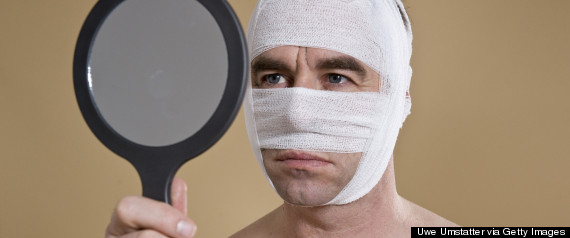
A smaller nose, perkier breasts, a tighter tummy -- from time to time, many of us find ourselves scrutinizing our bodies and wondering if perfecting our appearance would make life just a little bit more, well, perfect. We'd be lying if we said we'd never gone on some crazy crash diet to whittle our waists or used a pricey cream to tone our décolletage, but for some, it's an obsession that extends much further: to plastic surgery. But what you may not realize is the price of perfection goes deeper than your pockets.
Here are four reasons you should seriously reconsider going under the knife:
1. It's pricey.

According to the American Academy of Aesthetic Plastic Surgery, Americans spent over $7 billion last year in surgical procedures alone. Another
$5 billion was spent on non-surgical procedures, like injectables, and skin rejuvenation services. Nearly a third of surgical procedures were performed on patients over 50. The most popular procedures for post 50s? Liposuction, eyelid surgery, and facelifts. And it doesn't come cheap. On average, a facelift costs over $6,500. A tummy tuck? Over $5,000. A nose job? Over $4,000. That's a few months mortgage payment. Or a vacation or two, or more.
Factor in any time you have to take off from work to recover (or hide), and what you'll have to pay for touch-up procedures if you're not happy with the results. Plus, not all surgery is permanent. Things like breast implants aren't forever. According to the FDA, one in five women will have to have their implants removed within eight to 10 years because of complications. At around $3,000 bucks a pop, you're talking more than chump change.
2. It can be addictive. 
Sure, you'll think it's just this one time -- that's probably what Joan said. But countless plastic surgery addicts have said the same thing. In 2011, Cindy Jackson, broke the world record for having the most cosmetic procedures. (Yes, there's a World Record for that.) Jackson, 55 at the time, has spent around $100,000 on procedures including facelifts, nose jobs, and lipo since she first started in 1988. "I didn't set out to break, to set a world record, it was never my ambition, it's just that I had so much done," she said in an interview with ABC.
"It's not an official diagnosis," psychiatrist Katharine Phillips at Rhode Island's Butler Hospital told People. "But certainly patients can feel very driven to get cosmetic procedures; that it is their only hope." According to Phillips, while body dysmorphic disorder affects under 5 percent of Americans, it affects up to 15 percent of cosmetic surgery patients.
Think about when you try to dye your hair and don't like the results. What do you do? You try to fix it with more hair dye. More often than not, the results just aren't pretty.
3. It's risky business. 
Like you diligently read the warning labels on medications and beauty products (we hope), so should you be aware of the risks related to cosmetic procedures. You may not have known, but pre-existing conditions, like heart disease, diabetes, obesity, or even a smoking habit, can all interfere and cause complications, putting your health at risk. According to the Mayo Clinic, there are multiple risks, as with any surgery. Scars, nerve damage, infections, and blood clots are all possible complications.
Breast implants in particular can have a multitude of complications. While you may expect larger, perkier, more attractive breasts, asymmetry, deflation, or rippling can occur, worsening the appearance. And if you're seeking a quick fix for your saddlebags, liposuction likely won't remove your fat forever. A 2011 study at the University of Colorado Denver found the fat you lose, often rebounds just a year later, and reappears with a vengeance, particularly on your tummy and arms. Yeesh.
4. You might be unhappy with the results. 
You only have one body, and once you change it through cosmetic surgery, things will never really be the same again. You might think you've got nothing to lose, but surveys have shown that that's not always the sentiment you'll have after. In fact, one study showed that facelifts, brow lifts, and eye lifts don't really make you more attractive.
A study by the Aesthetic Surgery Institute found that just under a third of patients were unhappy with some aspect of their facelift. A Norwegian study found that adolescent girls who underwent cosmetic surgery were more likely to show symptoms of anxiety and depression, which researchers concluded, means cosmetic surgery won't fix any underlying mental health problems which drive you to it.
Plus if things wind up poorly, chances are, you might be even unhappier than you were to start with.
So, love yourself, and leave your pretty face alone.
